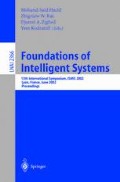Abstract
We propose the first paradigm that brings Feature Subset Selection to the realm of ILP, in a setting where examples are expressed as non-recursive Datalog Horn clauses. The main idea is to approximate the original relational problem by a multi-instance attribute-value problem, and to perform Feature Subset Selection on that modified representation, suitable for the task. The method acts as a filter: it preprocesses the relational data, prior to model building, and produces relational examples with empirically irrelevant literals removed. An implementation of the paradigm is proposed and successfully applied to the biochemical mutagenesis domain.
Access this chapter
Tax calculation will be finalised at checkout
Purchases are for personal use only
Preview
Unable to display preview. Download preview PDF.
References
H. Blockeel, L. de Raedt, N. Jacobs, and B. Demoen. Scaling up inductive logic programming by learning from interpretations. Data Mining and Knowledge Discovery, 3(1):59–93, 1999.
J. Fürnkranz. Dimensionality reduction in ILP: A call to arms. In L. de Raedt and S. Muggleton, editors, Proceedings of the IJCAI-97 Workshop on Frontiers of Inductive Logic Programming, pages 81–86, August 1997.
E. Alphonse and C. Rouveirol. Lazy propositionalization for relational learning. In W. Horn, editor, Proc. of the 14th European Conference on Artificial Intelligence (ECAI’2000), pages 256–260. IOS Press, 2000.
T. G. Dietterich, R. H. Lathrop, and T. Lozano-Pérez. Solving the multiple instance problem with axis-parallel rectangles. Artificial Intelligence, 89(1–2):31–71, 1997.
N. Lavrač, D. Gamberger, and V. Jovanoski. A study of relevance for learning in deductive databases. Journal of Logic Programming, 40(2/3):215–249, 1999.
L. de Raedt. Logical settings for concept-learning. Artificial Intelligence, 95(1):187–201, 1997.
M. Sebag and C. Rouveirol. Tractable induction and classification in first order logic via stochastic matching. In 15th Int. Join Conf. on Artificial Intelligence (IJCAI’97), pages 888–893. Morgan Kaufmann, 1997.
J.-D. Zucker and J.-G. Ganascia. Changes of representation for efficient learning in structural domains. In Proc. of 13 th International Conference on Machine Learning. Morgan Kaufmann, 1996.
A. Blum and A. Kalai. A note on learning from multiple-instance examples. Machine Learning, 30:23–29, 1998.
Y. Chevaleyre and J.D. Zucker. Noise-tolerant rule induction for multi-instance data. In ICML 2000, Workshop on Attribute-Value and Relational Learning, 2000.
K. Kira and L. A. Rendell. A practical approach to feature selection. In Proc. of the Ninth Int. Conference on Machine Learning., pages 249–256. MK, 1992.
U. Pompe and I. Kononenko. Linear space induction in first order logic with RELIEFF. In R. Kruse, R. Viertl, and G. Della Ricci, editors, Mathematical and Statistical Methods in Artificial Intelligence, CISM Course and Lecture Notes 363, pages 185–220. Springer-Verlag, 1995.
A. Srinivasan, S. Muggleton, and R.D. King. Comparing the use of background knowledge by inductive logic programming systems. In L. De Raedt, editor, Proc, of the 5th ILP, pages 199–230. Scientific Report, K.U.Leuven, 1995.
F. Esposito, N. Fanizzi, S. Ferilli, and G. Semeraro. Ideal theory refinement under object identity. In Proc. 17th International Conf. on Machine Learning, pages 263–270. Morgan Kaufmann, San Francisco, CA, 2000.
Author information
Authors and Affiliations
Editor information
Editors and Affiliations
Rights and permissions
Copyright information
© 2002 Springer-Verlag Berlin Heidelberg
About this paper
Cite this paper
Alphonse, E., Matwin, S. (2002). A Dynamic Approach to Dimensionality Reduction in Relational Learning. In: Hacid, MS., Raś, Z.W., Zighed, D.A., Kodratoff, Y. (eds) Foundations of Intelligent Systems. ISMIS 2002. Lecture Notes in Computer Science(), vol 2366. Springer, Berlin, Heidelberg. https://doi.org/10.1007/3-540-48050-1_29
Download citation
DOI: https://doi.org/10.1007/3-540-48050-1_29
Published:
Publisher Name: Springer, Berlin, Heidelberg
Print ISBN: 978-3-540-43785-7
Online ISBN: 978-3-540-48050-1
eBook Packages: Springer Book Archive

